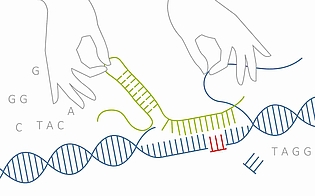News | Tuesday, 29 September 2015
Academies and DFG call for the responsible use of new genome editing techniques

Image: Sisters of Design
New molecular biology techniques that permit targeted genetic modification are giving rise to many promising new opportunities in research and application. At the same time, there must be dialogue with society as a whole on the opportunities and limits of these genome editing techniques. The German National Academy of Sciences Leopoldina, acatech – the National Academy of Science and Engineering, the Union of the German Academies of Sciences and Humanities, and the German Research Foundation (DFG) point this out in a joint statement entitled “The Opportunities and Limits of Genome Editing”.
The aim of the statement “The Opportunities and Limits of Genome Editing” is to prompt objective dialogue among society as a whole on the scientific, ethical and legal possibilities of genome editing and on its limits and consequences. The DFG and the academies stress that researchers must inform all stakeholders in a clear and transparent manner about the status of research to ensure that any decisions taken are based on sound scientific evidence.
In their statement, the academies and the DFG describe how genome editing works, its current stage of development, its fields of application, and its advantages over conventional gene modification processes. In some areas, the new genome editing techniques are already facilitating more efficient, much more targeted and more controllable genetic modifications.
The academies and the DFG stress that the use of genome editing is ethically and legally acceptable in many areas, but also point out its limitations and risks. They endorse the call for an international moratorium on all forms of human germline engineering that could have an impact on the genome of the offspring. In Germany, the relevant research is subject to strict legal regulations. The voluntary moratorium should create an opportunity to discuss and establish a binding framework for ethically and legally responsible research – at international level also.
Further Information
The opportunities and limits of genome editing (2015)
Statement on Plant Genetic Engineering (2015)
